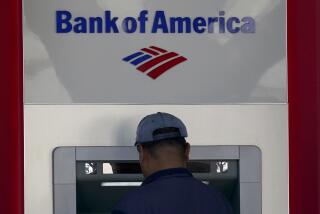B of A Lender Liability Case Goes Back to Court
- Share via
A landmark lender liability case is headed back to court after a Sonoma County judge granted two families of apple growers a new trial in their lawsuit against Bank of America.
Judge William L. Bettinelli refused the bank’s request that the lawsuit be dismissed. In a ruling late Monday afternoon, he said new allegations raised by the apple growers open the door for a second trial.
A spokesman for the San Francisco bank said the ruling would be appealed, while an attorney for the growers claimed that the decision will allow them to prove that the bank’s actions destroyed the apple growers’ business.
The suit was brought by the George M. Jewell family, major apple growers in Sebastopol, and the family-owned James O’Connell Co., a major apple processor in the Sonoma County town. They claimed that two Bank of America branch managers had promised long-term financing for a new processing plant. The families claimed that they lost millions of dollars when the bank failed to fulfill the promise.
In July, 1985, a jury awarded the families $46.7 million. The verdict helped create a wave of cases against banks by borrowers who contended that bank behavior damaged them.
A judge eventually lowered the award to $26 million, and Bank of America appealed the verdict. A year ago, an appeals court overturned the jury’s verdict and sent the case back to Bettinelli in the lower court. The appeals court found no evidence that the bank was responsible for the losses of the apple growers and said there was no written contract for the financing.
‘Destroyed Economically’
The narrow definition of the bank’s responsibility was viewed by banking attorneys as a significant victory for the industry.
The bank asked Bettinelli to dismiss the case, but late Monday he said new evidence raised by the growers warranted another trial.
A. Barry Cappello, the Santa Barbara lawyer for the growers, said new evidence will show that the families were destroyed economically as a direct result of the bank’s conduct and not by general economic factors and the growers’ own actions, as claimed by the bank.
Peter Samuel Magnani, a Bank of America spokesman, said: “Our view is that, in as much as the substantive issues have already been addressed by the courts and found to be unsupported by evidence, we are confident that we would prevail in any new action they might bring.”
More to Read
Inside the business of entertainment
The Wide Shot brings you news, analysis and insights on everything from streaming wars to production — and what it all means for the future.
You may occasionally receive promotional content from the Los Angeles Times.










